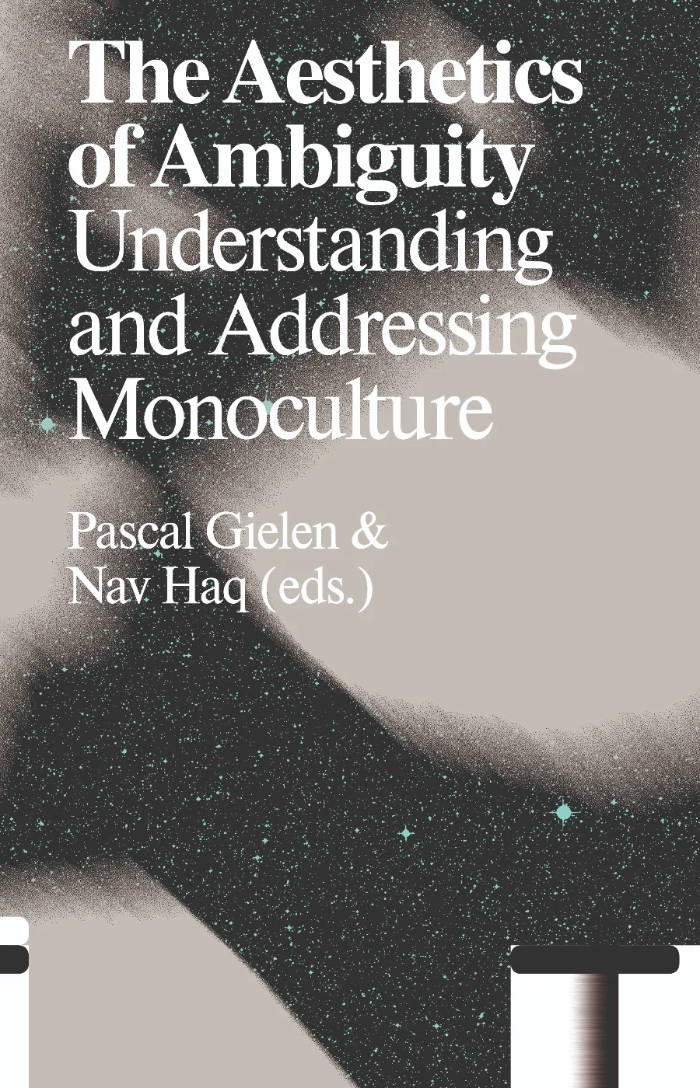Pascal Gielen
Pascal Gielen

The Aesthetics of Ambiguity
In The Aesthetics of Ambiguity: Understanding and Addressing Monoculture Pascal Gielen and Nav Haq argue that multiculturalism is paradoxically based on monocultural thinking. The publication explores this paradox by exploring monoculture in a variety of contemporary contexts. The book sets out to analyse monoculture using a multifaceted approach, by bringing together historical, social, cultural and ideological perspectives, using the dual role of art as tool for reconciliation and division in societies. The Aesthetics of Ambiguity gives stage to artists, thinkers and institutional practices who dare to play with the rules of a broader society and thus generate ambiguity ‘at large’. The book represents a quest for (more) ambiguity in order to avoid rigid borders or black-and-white polarities between cultures, as well as between practices of art and scientific thinking. By doing so, the artists, activists and researchers featured in this book plea for a politics and aesthetics of ambiguity to deal with the complexity of our living together on Earth.
Contributors: Paolo S.H. Favero, Pascal Gielen, Christine Greiner, Max Haiven, Nav Haq, Hedwig Houben, Iman Issa, Bojana Piškur, Public Movement, Jonas Staal, Mi You and Tirdad Zolghadr
Design: Metahaven

Sensing Earth: Cultural Quests Across a Heated Globe
Philipp Dietachmair, Pascal Gielen and 1 more
Sensing Earth states that our environmental issues are in the first place a matter of culture and aesthetics. Technology and science are not enough to solve these problems.
Our globe is facing an escalation of ecological problems, with no quick solutions in sight. We seem to be caught in a spiral of health issues, burnout, sensory overload, depression, and somatic deprivation. Artists faced with these crises are looking for ways to articulate the ongoing emergencies and explore possible ways out. However, the arts and culture are caught in a double bind. Artists and cultural initiatives need circulation to let ideas intersect and create meaningful connections. However, this globalized system also contributes to the planet’s ecological decline: by countless journeys from one biennale, international residency, touring exhibition and networking event to the next. After the Covid-19 pandemic ‘business as usual’ seems to prevail.
Sensing Earth includes essays, interviews, poetry, manifestos, choreographic prompts, speculative fiction, and case studies operating at the intersection of art and activism, culture and nature. All texts explore what sensorial foundations are necessary to address systemic failures, and what routes to take for keeping us moving on this planet, physically, emotionally and intellectually.
Contributors: Grégory Castéra, Center for Arts, Design and Social Research (Dalída Maria Benfield, Christopher Bratton, Luigi Coppola, Pelin Tan), Philipp Dietachmair, Futurefarmers, Pascal Gielen, Marina Guzzo, INLAND (Fernando García-Dory), Meander, Georgia Nicolau, Luciane Ramos Silva, Noel B. Salazar, Joy Mariama Smith, Naine Terena de Jesus, Dea Vidović, André Wilkens, Ana Žuvela
And more

Kwetsbaarheid — Over raken en geraakt worden
Marlies De Munck en Pascal Gielen
In een competitief bestaan verbergen we onze zwakke plekken. Evaluatiedrift en de voortdurende dwang tot innoveren duwen mensen steeds verder weg in een bolster. Hoe danook gaan we allen als knoeiers door het leven, vindt Marlies De Munck. Ze roept daarom op tot openheid en mededogen. Want dat bolsteren hindert je om te raken. En om geraakt te worden. Pascal Gielen houdt een warm pleidooi voor een esthetische kunde: het vermogen via al onze zintuigen een rammelende en fragiele werkelijkheid toch als een samenhangend geheel te ervaren. Dat is de potentie van kunst en cultuur: om ons te verzoenen met een chaotisch en kwetsbaar leven.
Marlies De Munck is cultuurfilosofe. Ze is als docent verbonden aan het Departement Wijsbegeerte van de Universiteit Antwerpen en aan het KASK & Conservatorium in Gent. Als lid van het Culture Commons Quest Office (CCQO) aan het Antwerp Research Institute For the Arts (ARIA) doet ze onderzoek naar de gezondheid van cultuur.